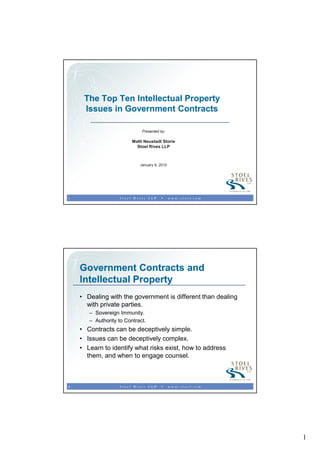
IP Developed Under Government Contracts
- 1. The Top Ten Intellectual Property Issues in Government Contracts Presented by: Matti Neustadt Storie Stoel Rives LLP January 6, 2010 1 Government Contracts and Intellectual Property • Dealing with the government is different than dealing with private parties. – Sovereign Immunity. – Authority to Contract. • Contracts can be deceptively simple. • Issues can be deceptively complex. • Learn to identify what risks exist, how to address them, and when to engage counsel. 2 1
- 2. Number 1: Sovereign Immunity • The government cannot be sued without its consent. – A private party cannot stop the government from taking intellectual property without an act of Congress to allow it. • Variety of laws allow private parties to enforce Intellectual Property rights against the government. – Contract Disputes Act. – Federal Tort Claims Act. – Applicable agency regulation. 3 Number 2: Authority to Contract • Actual authority versus apparent authority. – No apparent authority in government contracting. – Agency regulation dictates when a Contracting Officer – or even government attorney – may negotiate specific terms. • Ramifications: – Voided contract. – Voided contract provisions. 4 2
- 3. Number 3: The Christian Doctrine • G.L. Christian v. United States, 312 F.2d 418. • The government cannot enter into a contract that is contrary to the terms set forth by law or regulation. – Contracts will be “reformed” to include the appropriate clauses. – Clauses that are not permitted will be eliminated. – Clauses erroneously “negotiated out” will be reinserted. • Intellectual Property rights are “read in” to all government contracts. 5 Number 3 - cont’d: cont’d: The Christian Doctrine • Must know the actual clauses authorized by Congressional authority to analyze the contract. – Unauthorized clauses will be “reformed.” – Cannot otherwise advise your client as to the true risks and benefits of the arrangement. 6 3
- 4. Number 4: Types of Contracts • Procurement. – Purchasing goods and services. – Commercial vs. non-commercial items. – FARs, DFARs, DEARs, other FAR supplements, agency procurement regulations. • Non-Procurement. – Grants (including Recovery Act grants). – Cooperative agreements. – Technology Investment Agreements. – Venture funding. – Agency regulations on non-procurement transactions. 7 Number 5: Flavors of Intellectual Property • Patents. • Data Rights. – Copyright. • Works made by the government (or employees of the government in the scope of their employment) are not “copyrightable.” • But, government can own a copyright. – Trade Secrets. • Technical data. 8 4
- 5. Number 5 - cont’d: cont’d: Patents • Special notification required when prosecuting patents In 2008, the U.S. military developed under government was granted 528 patents in the U.S. More than Apple, contract. AstraZeneca, Verizon, and • March-In Rights. Google – combined.* – Bayh-Dole Act. *Source: Intellectual Property Owners – FARs and supplements. Association, http://www.ipo.org/AM/TemplateRedire • License grants. ct.cfm?template=/CM/ContentDisplay.c fm&ContentID=23598 9 Number 5 - cont’d: cont’d: Data Rights • Rights in data (generally). – Rights in technical data. – Rights in computer software. • Special considerations for software developed under government contract. – Commercial software vs. developed software. – Potential loss of trade secret option for developed software. 10 5
- 6. Number 5 - cont’d: cont’d: Copyrights • Government does not receive exclusive copyrights in works produced by government employees in the scope of their employment. • No “march in” rights for copyright ownership. • Licenses. – Unlimited rights. – Government purpose rights. – Limited rights. – Restricted rights. – Commercial license rights. 11 Number 5 - cont’d: cont’d: Trade Secrets • Disclosing secrets to the government. – Trade Secrets Act. – Non-Disclosure Agreements. • The “hybrid” NDA. • Procedural requirements for trade secret enforcement. – Notification / marking requirements. – Segregation requirements. – Reverse FOIA actions. – Agency-specific administrative proceedings. 12 6
- 7. Number 6: Business Type • Large business. • Small business. – SBA small businesses. – Small Business Innovation Research (SBIR) partners, • For Profit. • Non-Profit. 13 Number 7: Agency Philosophies • “Government Purpose” Agencies. – DoD. – HHS. – NIH. – Most others. • “Encouraging Innovation” Agencies. – DoE. – NASA. 14 7
- 8. Number 8: Prime Contractor or Subcontractor • Not all clauses in a prime contract are required to be passed through to subcontractors. • In some instances, prime contractors are prohibited from requiring their subs to transfer Intellectual Property ownership. – Prime contractor may still negotiate for it. • Notification language – Beneficial for use when organizations do not appear to be the “government”, but, in fact, are. – Beneficial when acting as subcontractor without notice as to the terms of the prime contract. 15 Number 9: Flexibility (and lack thereof) • Level of negotiation flexibility is primarily based on the agency, the type of contract, and type of business. – Easier to negotiation the specific deliverables and services than it is to negotiate specific clauses. – Flexibility is based on statutory discretion – not approval by Contracting Officer or even government attorney review. • Clients should also consider flexibility in future projects. – Strict conflict of interest rules. 16 8
- 9. Number 10: Doctrine of Segregability • Rights determined at the lowest practical segregated level. • Identification and segregation of “deliverables.” – Segregate finances. – Clearly identify deliverables. • Leverage commercial items. • Best opportunity for flexibility. 17 Conclusion • Risk versus reward. – Government contracts are big business. • In FY 2008, the U.S. government’s obligation under “cost reimbursement” - type contracts alone was $136 billion. – Terms related to intellectual property are not typical for similar contracts between private parties. • Broad licenses. • Ownership rights. • Keys: – Identify the risk. – Determine if the risk can be mitigated and how. 18 9
- 10. Questions? Thank you. Matti Neustadt Storie 503.294.9523 mnstorie@stoel.com 19 10
